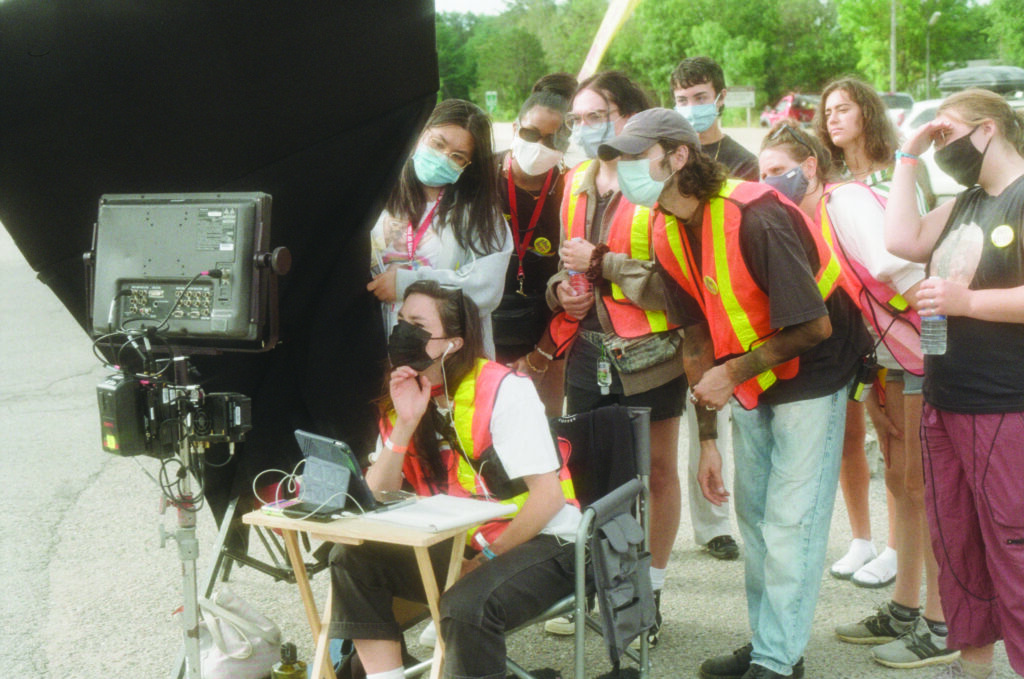
Listen to the audio version below:
When she was a teenager, Luis De Filippis went to see Marie Antoinette in theatres, and it was Sofia Coppola’s reimagination of Antoinette that inspired the trans femme filmmaker to pursue a career in film. “Suddenly [Antoinette] wasn’t raunchy anymore. She was like Paris Hilton,” says De Filippis.
De Filippis is a creative director and screenwriter who is challenging the barriers of inclusivity for transgender and queer representation in the film by filling the gap of missing trans stories.
Filippis’s first short film For Nonna Anna, won a Special Jury award at Sundance in 2018, which introduced her to Canadian audiences.
Premiering at TIFF this month, De Filippis’ debut film Something You Said Last Night, follows Ren, a young woman who heads on a family vacation. Ren is an aspiring writer and is dealing with her identity as a transwoman amongst her Italian family.
De Filippis’ stories are unique because she focuses more on trans stories than just their sexual orientation or identity. “The media has been focused on one small aspect of our experience,” she said “there are many other stories about trans identities that aren’t about the mechanics of transition. When you start telling stories of trans people where their trans isn’t centred, you can really start seeing them just as people. And to me, that’s really important.”
In North American TV and film, the LGBTQ2S+ representation has grown over the last two decades, but transgender representation is still scarce. De Filippis’ work is noticeably opening space for transgender creatives in the Canadian film industry, with her diverse film crews, cast, and mentorship opportunities.
LGBTQ2S+ representation in television and film has increased in recent years, according to a recent GLAAD survey. Forty-two trans characters graced Canadians’ screens across primetime and streaming services in 2021-2022, an increase of 2.8 per cent from last year, the survey reported.
De Filippis also advocates for the importance of trans voices in leadership because it increases narratives that come from various queer perspectives. Like De Filippis, many directors draw from childhood when creating films and the personalities around them.
De Filippis studied in the film program at Toronto Metropolitan University (TMU) where she says she found success by surrounding herself with a tight-knit community. TMU gave her the opportunity to meet like-minded creatives which she said is the reason she got through the tough, demanding program.
“I banded together with women in my program, people of colour, queer people and we kind of became a little unit, and that’s how we were able to do our work,” said De Filippis.
Diversity and representation in media are important as media is a mirror that reflects human thoughts, opinions and values, says De Filippis.
Gabrielle Zilkha, a Toronto-based award-winning director, writer and producer, said that having representation on screen can be lifesaving and affirming for marginalized communities.
“Sometimes it’s really difficult for folks who aren’t necessarily from an equity deserving community or who have been marginalized from the screen to understand just how impactful it is, to not see yourself or to see yourself [on screen],” Zilkha said.
De Filippis, Balal Baig, creator of HBO’s Sort Of, and Black trans artist Lucah Rosenburg-Lee are three marginalized filmmakers who hosted the first TIFF x Trans Film Summit in mid-September acknowledging and representing trans film and trans actors at the TIFF.
“The Trans Film Summit showed me that there were people who needed to see that trans folks are in leadership positions,” Zilkha said. “And, not only does it show that that is possible, and that they can control a story and that their stories are valued, but that they may actually change the system to a degree, to increase access for other non-binary folks,” she said.
In addition to directing films, De Filippis has also lent a hand to others in her industry by being a mentor to other trans and LGBTQ2S+ individuals. She founded the Trans Film Mentorship, which provides transgender and non-binary youth with experience on set. So far, mentees have either worked on the set of Something you Said Last Night, Sort Of, or are currently working on a new documentary with Rosenburg-Lee about American soul singer Jackie Shane.
Zilhka, who currently runs the Trans Film Mentorship believes its value is to help people access networking and resources. “It was about designing programs that provided the baseline competencies or skills that you [they] really need,” she says.

On the set of De Filippis’ last film, Ms. Myles, a trans woman, worked on hair and makeup. Via email she said De Filippis “ensured audiences that our stories (were) worthy of taking up space,” adding her experience with the Trans Film Mentorship opened “countless doors.”
For young creatives, De Filippis suggests finding a support network of, “people who really trust, love, and support you and work on each other’s films.”
De Filippis wants to see as many, “different stories being told by as many different trans people.” She also wants to see more interesting stories on screen in the future.
“Our stories are so completely different from one another. And, that’s what really excites me as well,” De Filippis said. “Not every trans woman is going to tell the same story and wants to tell the same story.”
“To me, that’s true representation…when you have conflicting viewpoints and different ways of telling the same story, and I’m really excited to see what’s going to happen moving forward.”
Sports/Arts/Life editorOn The Record, Fall 2022.

